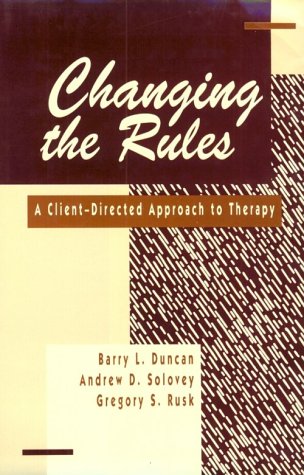All therapists at some time or other are confronted with cases that do not fit the assumptions of their chosen theoretical model--clients who should get better do not, while others improve for reasons the model does not explain. One lesson that can (and should) be drawn from such cases is that the client's perception of the therapist's behavior and of the intervention process is a powerful factor in therapeutic success or failure. These relationship factors account for a significant proportion of change in psychotherapy, yet little has been written about how to utilize them. Filling a gap in the literature, this book presents a pragmatic application of these simple but difficult experiential lessons to the practice of individual, couple, and family therapy.
When should a therapist shift gears? And how is it done?
CHANGING THE RULES presents a flexible methodology for practice that encourages clinicians to utilize their clients' interpretations in constructing more effective interventions. Providing a developmental and empirical context for the approach, the book covers the initial interview and the selection, design, and delivery of interventions, as well as issues such as ethics and gender bias. Several case examples and two full-length studies demonstrate each stage of the therapeutic process, fully illustrating the approach and enabling the creative therapist to replicate it in practice.
Proposing a coherent framework for practice that empowers relationship effects, enhances therapist flexibility, and expands the repertoire of intervention strategies for working with individuals, couples, and families, this volume is an invaluable resource for clinicians, academicians, and students regardless of theoretical orientation.
Barry L. Duncan, PsyD, is Director of The Dayton Institute for Family Therapy, a private treatment and training center in Centerville, Ohio. He is also a clinical assistant professor at Wright State University and past president of the Ohio Division of the American Association for Marriage and Family Therapy. In addition to maintaining a clinical practice, teaching graduate students, and training mental health professionals, Dr. Duncan frequently conducts workshops for therapists across the country.
Andrew D. Solovey, LISW, is Clinical Director of Scioto Paint Valley Mental Health Center in Chillicothe, Ohio. He also provides psychotherapy services to individuals and families at an inpatient rehabilitation center. Throughout his career, he has done clinical work with a wide range of clients in a variety of settings. He enjoys teaching and training psychotherapists, and his main interest is the challenge of searching for solutions in cases that are considered to be hopeless.
Gregory S. Rusk, ACSW, LISW, is in practice in Cincinnati and Dayton, Ohio. He is a clinical member of the American Association for Marriage and Family Therapy. He has coauthored articles on eclectic psychotherapy with colleagues at The Dayton Institute for Family Therapy and has presented workshops on client-directed psychotherapy.
